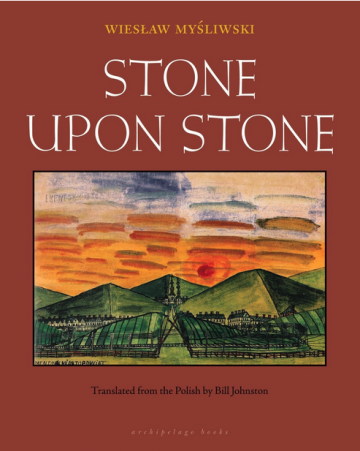Wieslaw Myśliwski's STONE UPON STONE
Translated from Polish by Bill Johnston, who received a National Endowment for the Arts Poetry Fellowship in Translation, Stone Upon Stone by Wieslaw Myśliwski is built on big questions about spirituality and relationship to place. These universal themes are reflected in section titles like “The Cemetery,” “The Land,” “Mother,” and “Hallelujah.” Myśliwski has twice received Poland's most prestigious literary award, the Nike Prize, and this is commonly regarded as his best work.
The novel begins just before World War II in a village cemetery where families compete for the most ostentatious tombs, as the narrator, Szymek, goes about having a tomb built (a tomb that reappears throughout the novel). Szymek, in debt, not only needs money to build it, but he also needs his city-dwelling brothers to agree to be buried in it because he has decided to build the tomb with eight compartments, four on top, and four below for the closest family. These are his constant worries.
As the story builds, the details of Szymek's life become more meaningful to the reader as his character increases in depth. We follow him to village dances where he drinks and pursues women, believing him to be the most good-looking man there. We experience his hunger as he reaches for the bread that his father hid in the rafters to be used in a spring fertility ceremony. We understand the way he believes in God when he says, “blessed eggs taste different than eggs that haven't been blessed.” We understand Szymek as a complete person.
Stone Upon Stone follows a non-traditional plot structure where one scene sparks the next, creating an atmosphere that mirrors the village's bustling life. The first chapter centers on Szymek's memories of the many village funerals of both common and notable townspeople. The scenes don't always occur chronologically. Szymek's stay in the hospital appears in the narrative before his accident occurs placing the importance on Szymek's reaction to the events rather than on the events themselves. He gets into an accident crossing the road that has been newly built and spends months in the hospital. Meanwhile, the land that means so much to him has gone to ruins in his absence. The book might be best framed in the context of peasant literature. Myśliwski makes a comment about intellectual life versus physical labor: “And after all, what was the point? You read and read, and in the end it all went into the ground with you anyway. With the land it was another matter. You worked and worked the land, but the land remained afterwards. With reading, not even a line, not a single word was left behind.”
Yet, after Szymek returns from the hospital he muses about the importance of words, “God tells people to pray in words because without words he wouldn't know one person from the next.” Szymek understands that there was importance in the telling of the story. Myśliwski's use of language is beautiful, but at times melodramatic.
An example occurs of the melodrama when he writes about drinking: “your soul became like a wide-open barn, like a stream from a spring, and you felt you could grasp your whole life in your hand.” This line stands out in that it speaks about the relationship to the land and the immensity of life, which are important themes throughout the novel. The title of the novel comes from a folk song that Szymek wants to take with him to the next world, “Stone upon stone/On a stone a stone/And on that stone/Another stone.” The novel is similarly structured: one vignette from Szymek's life is carefully placed on top of the next, each carrying similar weight.


